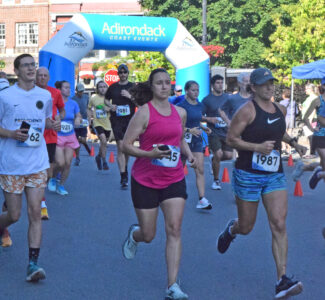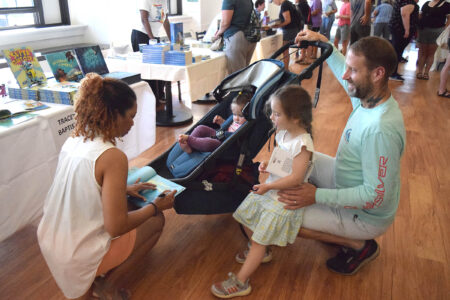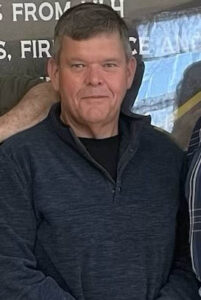The road to Whiteface
LAKE PLACID – When Josh Suskewicz looks at mountain towns and ski resorts across the country, he sees the “ultimate opportunity” for destinations like Whiteface Mountain.
The Brooklyn-based partner at the innovation consulting firm Innosight and frequent skier foresees the evolution of social media into more specific social networks that cater to people’s passions.
Think a “Facebook for skiing.” But better, because your grandparents or high school buddies aren’t involved unless they’re skiers or snowboarders too.
In the innovation industry, it’s dubbed a “vertical social network.” For a skier, it’d be the one app on your phone filled with anything and everything to help you get your snow sport fix.
To Suskewicz and others in the innovation industry, Facebook is too broad. The 32-year-old foresees someone building peer-to-peer “ecosystems,” places where the adventurous millennial masses can live virtually and, of course, spend money through their fingertip-to-phone existences.
“There is already a community around it and information you need, like what runs are up at the park, deals and getting rides,” Suskewicz said.
The opportunity, he says, is there for smaller startups, bigger ski and snowboard companies, mountain resorts like Whiteface and even vacation destinations like those in the Adirondacks.
—
Specific social networks
The idea is based on horizontal peer-to-peer and e-commerce services that already exist. Vertical social networks are out there now for professionals in information technology, education, real estate, medicine and the military. And the laundry list of niche dating websites and apps like Tinder are also an example of more interest-specific social networks.
For adventure sports like skiing, what exists now are smaller services and sites that provide segments of the adventure and winter sport experience to consumers. Along with ticket deal websites like Liftopia, those services include more established long distance tour operating services like OvRride.
But newbies like crowd-sourced transportation services Shredshare, NYC Snow Bus, Rally Bus and Skedaddle are taking consumers closer to the kind of one-stop-shop ecosystems Suskewicz thinks are tailor-made for adventurists.
The services are also providing progressive ways to get the masses to the mountains as a much cheaper and more flexible alternative to more established transportation routes, like Amtrak.
—
Current travel options
Since 1996, Amtrak has run a train to Montreal that provides a bus shuttle from its Westport station 34 miles east of Lake Placid. A round-trip ticket from New York City to Lake Placid can cost more than $200 and takes around 15 hours with two transfers. The train has a limited schedule on the weekends.
Greyhound and Adirondack Trailways provide service from New York City to Lake Placid, on a similar limited schedule including a round-trip that lasts 16 hours with two transfers costing upwards of $160
The state Olympic Regional Development Authority, based in Lake Placid, runs the Whiteface, Gore and Belleayre Mountain ski centers. ORDA Director of Communications Jon Lundin said Tuesday that Whiteface does not deal with bus tours or car-share programs in New York City. He didn’t respond to email questions about if Whiteface is interested in or currently looking into long distance transportation via bus services or car-shares from New York City or other metropolitan areas.
—
Looking ahead
With 21st century convenience and cost-cutting in mind, some community figures in Lake Placid and dreamers working out of Brooklyn-based coffee shops think Suskewicz may be on to something.
Take, for instance, Jason Greenhouse, the founder of, Shredshare, the Web-based car-share service some have dubbed “the Uber for skiing and snowboarding.”
Greenhouse is one of those dreamers, a 34-year-old snowboard-crazed Etsy employee who has created a first-of-its-kind long-distance car-share service that his riders swear saves them upwards of $60 per trip. In its second year, Shredshare averages about a half-dozen car-shares every weekend.
Once his service finds traction, Greenhouse has bigger ideas for what he’d like to provide for the community he loves thanks to his peer-to-peer e-commerce experience at Etsy.
“The sport is so expensive, it’s almost elitist,” Greenhouse said. “It’s sad.
“A lot of what Shredshare is about is access. We want to show community members nature when they are stuck between skyscrapers and projects. All we are trying to do is send the mountains visitors, to create a giant group of skiers and snowboarding millennials, with peer-to-peer collective bargaining leverage.”
“The mountains should be all over it,” Suskewicz said of services like Shredshare. “If I were with the mountain, I’d be doing whatever I could to help it take off, because it would lead to a lot more engagement and a lot more trips.”
—
Getting people to the mountains
In Lake Placid, High Peaks Cyclery owner Brian Delaney is far from being a millennial, but the adventure sport ambassador was once a 25-year-old looking for the best bang for his buck when traveling up from New Jersey to ski at Vermont’s Stowe Mountain Resort. Looking back, Delaney says if vertical social networks or transportation-shares existed like they do now, he would have tried them.
When thinking about his shop’s current customer base, he thinks they’d be interested as well. He said he thought of the idea recently, too.
“We want to have: Here’s our guided snowshoe trips; here’s our guided ice-climbing trips; here’s our backcountry ski trips,” Delaney said. “This is the gear you need. This is the gear included in your trip. This is the gear you need to rent. And if you rent it, this is what we put toward your purchase and this is the gear you can buy now.
“And,” he said, “you click.”
Kelly Sullan, a Brooklyn-based graphic designer, shares much the same sentiment. Originally from New Hampshire, she grew up skiing at local mountains and visited Whiteface for the first time three weeks ago. She rented a car with three others through Enterprise and found a Wilmington cabin to stay in via the peer-to-peer lodging site Airbnb.
The 27-year-old said she’d be interested in vertical social networks for adventure sports, but she did warn that many New York City residents perceive Lake Placid as being too far considering the current transportation linkages.
“The innovative aspect of it is good for the mountain,” Sullan said. “Whichever one is priced better. I could do car or bus.
“But that’s the one barrier for Whiteface,” she added. “It’s just enough hours away. But if that were a known way to get up to the mountains or back, it would be a hit.”
—
NYC Snow Bus
One of those new options, NYC Snow Bus, is in its second year operating out of Brooklyn. Co-founder Ayo Omojola, 30, and her company began providing buses to Northeast ski resorts last season. The company works with small independent bus companies in the New York City area and currently lists Whiteface as a day-trip destination along with Gore Mountain, Hunter Mountain, Windham, Mountain Creek, Killington and Mount Snow. Omojola says NYC Snow Bus sends 10 buses to destinations each weekend for day-long trips, with anywhere from 500 to 650 people riding. A minimum of around 25 riders is typically required for a bus to take off.
A NYC Snow Bus Trip has yet to go to Whiteface this season as a result of warm winter weather, but Omojola says it plans to go soon. Buses are being advertised this weekend at each of the other six mountains. A NYC Snow Bus trip and lift ticket to Gore Mountain in North Creek this Saturday costs $109.
Last winter NYC Snow Bus provided similar services for its Whiteface trips, picking up riders between 3 and 4 a.m. on weekend mornings at central locations in New York City before arriving at Whiteface between 8:30 and 9 a.m. The bus departed for New York City at 4:30 p.m. NYC Snow Bus operates on this schedule due to Federal Motor Carrier Safety Administration regulations for bus drivers.
Omojola says NYC Snow Bus has plans to expand, including full weekend trips, as day trips restrict the services and experience her company can provide. The weekend-long trips would expand the consumer base but would require business relationships with lodging establishments in mountain towns.
The first place NYC Snow Bus is looking at is Lake Placid. Omojola said she has spoken with people at the High Peaks Resort about the idea.
—
OvRride
Another NYC-to-mountain transportation company that does not service Whiteface is OvRride, a global company that provides luxury day-trip bus service to Hunter and Windham, ski areas in the Catskills, and three mountains in Vermont. OvRride also advertises day and weekend trips to Killington, Jay Peak, Stowe and Sugarbush in Vermont.
OvRride provides similar services at mountains on the West Coast, in Alaska, the Alps, Japan and South America thanks to packages that include round-trip airfare from New York City. The company also does regional and international summer trips including weekend whitewater rafting bus tours to locations in Watertown and Lake George.
—
Winter ski bus
In November, Gov. Andrew Cuomo announced the I LOVE NEW YORK winter ski bus would begin weekly trips from New York City and Long Island to upstate ski areas on January 22 via a partnership with the sporting good and outdoor gear company Recreational Equipment Inc. The winter program announced featured an overnight trip to Whiteface Mountain.
The I LOVE NEW YORK bus website currently lists select lift ticket and round-trip luxury motor coach day trips to Hunter, Platteekill Mountain and Belleayre for around $100. This week, the site did not list service for overnight trips, or to Whiteface.
—
Crowd-sourced travel
Another development in the social media and peer-to-peer worlds is crowd-powered travel, like Rally Bus and Skedaddle. They allow consumers to join bus routes or create their own routes for any event. “Crowd-sourced” travel like this is possible thanks to partnerships with local bus companies.
Both companies have had bus routes for adventure sport activities, and Rick Thorpe, Northeast regional director of sales for Peak Resorts, says he’s been contacted by numerous crowd-sourced bus-share services this season, recently reaching an agreement with Rally Bus.
“A lot of them are just breaking into the skiing space,” Thorpe said.
—
Connecting millennials
Getting people to Lake Placid has always been a challenge. During the early part of the 20th century, visitors from New York City and cities like Utica and Plattsburgh were able to access the Tri-Lakes area thanks to regional rail service. But by the 1960s, passenger rail service had left the region.
In Lake Placid, Regional Office of Sustainable Tourism CEO Jim McKenna expressed interest in the concept of crowd-sourced travel earlier this week.
McKenna’s interest came a week after a community forum on Lake Placid’s event economy where he mentioned how the region is at a disadvantage because of a lack of transportation linkages. McKenna also said this week ROOST is focused on the idea of the Plattsburgh International Airport serving as a national connection airport to benefit the region.
At the forum, he brought up how shifting demographics nationally contrast with the community’s events in some ways and how the region needs to cater more to young, urban people who don’t own cars.
Last month, the Wild Center nature museum in Tupper Lake issued an 85-slide presentation entitled “Connecting Millennials to the Adirondacks,” based on a study that included more than 1,000 respondents ages 22 to 34.
The study recommended ROOST “approach mobile, social, content, advertising and booking with a united front.” It found that 58 percent of respondents would consider using Airbnb or another home rental service, and found that only 16 percent of NYC area resident respondents had been to the Adirondacks.
“Aside from direct air access from Boston to the Adirondack Regional Airport (in Lake Clear), we are a rubber tire destination,” ROOST Director of Communications Kim Rielly said in a statement this week. “The perception that access to the region is difficult is one of the biggest challenges we have. We know from the recent study conducted on behalf of the Wild Center in 2015 that the millennial generation is unwilling to travel more than four hours away for a regional trip. That is a significant disadvantage to our region, with millions of potential visitors just out of that range.
“Communities such as Shredshare that create mini online ecosystems for people with shared interests, as well as the less-flexible bus ride-share options can certainly be part of a solution, especially for the millennial traveler,” she added. “It will be interesting to see how these platforms evolve.”



